|
|
|
Sort Order |
|
|
|
Items / Page
|
|
|
|
|
|
|
| Srl | Item |
| 1 |
ID:
125031
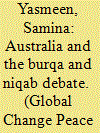

|
|
|
|
|
| Publication |
2013.
|
| Summary/Abstract |
This paper locates the discussion on wearing niqab and burqa within the context of information acquisition and response formation among Muslims and non-Muslims in the contemporary world. The paper argues that, against the backdrop of varied opinions on Islam and Muslims around the world, the debate on wearing burqa represents the continuation - albeit up-scaling - of the focus on Muslim women as the signifiers of Islam and Muslim identities. Australia is influenced by, and dealing with, the debate on whether or not to ban the burqa and niqab. Opinions among both the wider community and Muslims have differed on the justification and advisability of such a ban. The Australian government at the federal and state levels has demonstrated cautious activism in dealing with the issue, thus protecting the rights of Australian Muslim minorities, and reducing the space in which a heightened sense of exclusion could develop among them.
|
|
|
|
|
|
|
|
|
|
|
|
|
|
|
|
| 2 |
ID:
131516
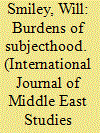

|
|
|
|
|
| Publication |
2014.
|
| Summary/Abstract |
This article analyzes the changing treaty law and practice governing the Ottoman state's attitude toward the subjects of its most important neighbor and most inveterate rival: the Russian Empire. The two empires were linked by both migration and unfreedom; alongside Russian slaves forcibly brought to the sultans' domains, many others came as fugitives from serfdom and conscription. But beginning in the late 18th century, the Ottoman Empire reinforced Russian serfdom and conscription by agreeing to return fugitives, even as the same treaties undermined Ottoman forced labor by mandating the return of Russian slaves. Drawing extensively on Ottoman archival sources, this article argues that the resulting interimperial regulations on unfreedom and movement hardened the empires' human and geographic boundaries, so that for many Russian subjects, foreign subjecthood under treaty law was not a privilege, but a liability.
|
|
|
|
|
|
|
|
|
|
|
|
|
|
|
|
| 3 |
ID:
115051
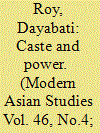

|
|
|
|
|
| Publication |
2012.
|
| Summary/Abstract |
This paper explores the institution of caste and its operation in a micro-level village setting of West Bengal, an Indian state, where state politics at grass roots level is vibrant with functioning local self-government and entrenched political parties. This ethnographic study reveals that caste relations and caste identities have overarching dimensions in the day-to-day politics of the study villages. Though caste almost ceases to operate in relation to strict religious strictures, under economic compulsion the division of labour largely coincides with caste division. In the cultural-ideological field, the concept of caste-hierarchy seems to continue as an influencing factor, even in the operation of leftist politics.
|
|
|
|
|
|
|
|
|
|
|
|
|
|
|
|
| 4 |
ID:
126664
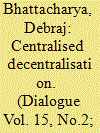

|
|
|
| 5 |
ID:
126659
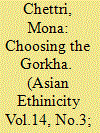

|
|
|
|
|
| Publication |
2013.
|
| Summary/Abstract |
The Darjeeling hills in northern West Bengal, India are being demanded as a homeland for the Gorkha community living in India. While the origin of Darjeeling is steeped in the imperial legacy of the British Raj, the Gorkha, a colonial construct is ironically used as a means to challenge the contemporary political regression and neo-colonisation of Darjeeling. Although the Gorkha identity is deemed as representative of the Nepali community residing in India, it acquires special meaning and importance in the Darjeeling hills, where majority of the people suffer low wages, unemployment, underdevelopment and poverty. In spite of a large working force in the tea estates, economic underdevelopment and political disempowerment is voiced through the assertion of ethnic rather than a class-based identity. Through an examination of the interaction between class and ethnicity, the Gorkha identity will highlight the malleability of ethnicity to extend itself to any situation and the emergence of an ethnic identity from class relations and grievances.
|
|
|
|
|
|
|
|
|
|
|
|
|
|
|
|
| 6 |
ID:
131143
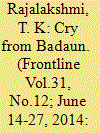

|
|
|
|
|
| Publication |
2014.
|
| Summary/Abstract |
The gang rape and murder of two minor girls in Uttar Pradesh brings to the fore factors such as cast dynamics and police apathy behind the growing crimes against women.
|
|
|
|
|
|
|
|
|
|
|
|
|
|
|
|
| 7 |
ID:
130962
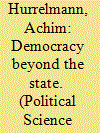

|
|
|
|
|
| Publication |
2014.
|
| Summary/Abstract |
MODERN DEMOCRACY IS, ABOVE ALL ELSE, a procedural ideal. To be sure, high substantive hopes are often placed in democracy. Yet the essence of democracy lies not in the specific outcomes that it may (or may not) help reach, but in a set of procedures that ensure, in the words of Philippe Schmitter and Terry Karl, that "rulers are held accountable for their actions in the public realm by citizens," who act primarily "through the competition and cooperation of their elected representatives."1 Historically, the main political arena in which democratic procedures have been implemented, and the main reference point for democratic theory, has been the state. According to a well-established argument, the democratization of non-state entities-such as international and supranational organizations or transnational networks with various degrees of institutionalization-is therefore faced with significant conceptual and practical challenges.2 This article seeks to assess the severity of these challenges: Can democratic procedures be transferred to political entities "beyond the state," or is democracy doomed to failure in non-state contexts?
|
|
|
|
|
|
|
|
|
|
|
|
|
|
|
|
| 8 |
ID:
146102
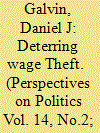

|
|
|
|
|
| Summary/Abstract |
Can stronger state-level public policies help protect workers from “wage theft?” In recent years, workers' rights groups have responded to policy drift and legislative inaction at the national level by launching campaigns to enact stronger penalties for wage and hour violations at the state level. Many of these campaigns have been legislatively successful and formative for the development of “alt-labor.” But are such policies actually effective in deterring wage theft? Previous scholarship has long concluded that although stronger penalties should theoretically make a difference, in practice, they do not. But by confining the analysis to the admittedly weak national-level regulatory regime, the existing literature has eliminated all variation from the costs side of the equation and overlooked the rich variety of employment laws that exist at the state level. Using an original dataset of state laws, new estimates of minimum wage violations, and difference-in-differences analyses of a dozen recently enacted “wage-theft laws,” I find that stronger penalties can, in fact, serve as an effective deterrent against wage theft, but the structure of the policy matters a great deal, as does its enforcement. The implications for workers' rights and the changing shape of the labor movement are discussed in detail.
|
|
|
|
|
|
|
|
|
|
|
|
|
|
|
|
| 9 |
ID:
127820
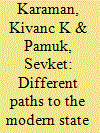

|
|
|
|
|
| Publication |
2013.
|
| Summary/Abstract |
Theoretical work on taxation and state-building borrows heavily from early modern European experience. While a number of European states increased centralized tax revenues during this period, for others revenues stagnated or even declined and these variations have motivated alternative arguments for the determinants of fiscal and state capacity. This study reviews the arguments concerning the three determinants that have received most attention, namely warfare, economic structure, and political regime, and tests them by making use of a new and comprehensive tax revenue dataset. Our main finding is that these three determinants worked in interaction with each other. Specifically, when under pressure of war, it was representative regimes in more urbanized-commercial economies and authoritarian regimes in more rural-agrarian economies that tended to better aggregate domestic interests towards state-building.
|
|
|
|
|
|
|
|
|
|
|
|
|
|
|
|
| 10 |
ID:
130789
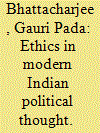

|
|
|
|
|
| Publication |
2014.
|
| Summary/Abstract |
Political _thought is concerned with the state, and the sovereign power of the state is legally unlimited, though it is not arbitrary. It is exercised with the objective of realizing some interest of the state. With the rise of the concept of democracy there arose, not only the importance of the individual but also the long struggle between state sovereignty on the one hand, and individual freedom on the other, ultimately giving rise to the concept of democracy. Democracy does not mean s-imply majority rule. It implies majority rule with full rights of all. The simple view of majority rule gave rise to the misleading concept of democratic dictatorship, and in a democracy an individual, even if he becomes a minority of one, is entitled to enjoy all the rights embodied in the constitution. Democracy therefore implies rights of all and rule by the majority opinion as ascertained periodically.
|
|
|
|
|
|
|
|
|
|
|
|
|
|
|
|
| 11 |
ID:
155044
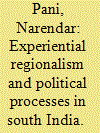

|
|
|
|
|
| Summary/Abstract |
Regional identities have periodically asserted themselves in Indian politics, both before and after Independence. The intensity of this regionalism has, however, tended to vary quite substantially from state to state and over time, ranging from a somewhat benign influence on state politics to demands for secession. These differences are typically explained in terms of specific local political conditions. While the local is undoubtedly important, this article argues that a larger theoretical explanation is also possible: Once we recognize that regionalism operates in multiple spaces, it becomes evident that the way these spaces are experienced has its influence on the practice of local politics. The article goes on to match its theoretical expectations with the politics of regionalism in the neighboring south Indian states of Karnataka and Tamil Nadu.
|
|
|
|
|
|
|
|
|
|
|
|
|
|
|
|
| 12 |
ID:
127832


|
|
|
|
|
| Publication |
2013.
|
| Summary/Abstract |
Federalist democracies often hold concurrent elections for multiple offices. A potential consequence of simultaneously voting for multiple offices that vary with respect to scope and scale is that the personal appeal of candidates in a high-profile race may affect electoral outcomes in less salient races. In this article I estimate the magnitude of such coattail effects from governors onto other concurrently elected statewide executive officers using a unique dataset of county election returns for all statewide executive office elections in the United States from 1987 to 2010. I exploit the disproportionate support that candidates receive from geographically proximate voters, which is often referred to as the friends-and-neighbors vote, to isolate variation in the personal appeal of candidates. I find that a one-percentage-point increase in the personal vote received by a gubernatorial candidate increases the vote share of their party's secretary of state and attorney general candidates by 0.1 to 0.2 percentage points. In contrast, personal votes for a secretary of state or attorney general candidate have no effect on the performance of their party's gubernatorial candidate or other down-ballot candidates
|
|
|
|
|
|
|
|
|
|
|
|
|
|
|
|
| 13 |
ID:
106452


|
|
|
|
|
| Publication |
2011.
|
| Summary/Abstract |
When political parties organize, compete and maintain interests at different levels, they bring interconnections both between as well as horizontally across levels. This study suggests that the autonomy of state politics formulation may have to pay greater attention to the federal framework and give more consideration to the role of polity-wide parties. This study uses the autonomy thesis as a heuristic tool and expands the discussion beyond state politics as considered by Yogendra Yadav-Suhas Palshikar. It examines the interface between the rise of the state as the primary unit and the functioning of political parties, especially in a multi-party competitive scenario where parties are forced to enter into coalitions. By situating India and its coalition experiences within a broader literature of comparative politics, the study tries to enrich our understanding about the relationship between federalism, political parties and coalition politics.Government
S
|
|
|
|
|
|
|
|
|
|
|
|
|
|
|
|
| 14 |
ID:
131423
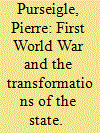

|
|
|
|
|
| Publication |
2014.
|
| Summary/Abstract |
Scholars of the First World War have long recognized the critical role played by the state in leading, organizing and managing the mobilization of belligerent societies, and the state's transformations have testified to the impact of industrialized warfare. Since the late 1980s, however, the cultural turn that largely accounts for the renewal and dynamism of First World War studies has shifted the emphasis away from the wartime state and its operations. Its study relatively suffered as a result. This article aims to bring the state back into the centre of the historiographical discussion, since its transformations testified to the nature and political impact of industrialized warfare. The article therefore focuses on three critical aspects of the relationship between state and society: the deployment of coercion, the expression of national solidarity and the redefinition of sovereignty. It demonstrates how the logic of mass participation in modern warfare transformed both the contours and the foundations of the state. To do so, the article draws on a renewed engagement with social scientific literature and the sociology of the state in particular.
|
|
|
|
|
|
|
|
|
|
|
|
|
|
|
|
| 15 |
ID:
128991
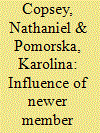

|
|
|
|
|
| Publication |
2014.
|
| Summary/Abstract |
This article seeks to examine and assess the role of Poland in the early stages of the making of the Eastern Partnership of the European Union. First, it briefly reviews Poland's aims and ambitions with regard to the European Union's policy towards its eastern neighbours, both before and since it joined the European Union in 2004. Second, it describes and analyses the Eastern Partnership, including its added value for the European Neighbourhood Policy. Third, it draws on a range of interviews carried out by the authors in Brussels and Warsaw on Poland's role in the initial formation of the Eastern Partnership, as seen by its partners in the other member states and European institutions. In addition, it seeks to unpack some of the early stage lessons learnt by the Polish government about how best to achieve its ambitions in the European Union, and notes the remaining weaknesses of the Polish administration, particularly in the area of administrative capacity.
|
|
|
|
|
|
|
|
|
|
|
|
|
|
|
|
| 16 |
ID:
057682
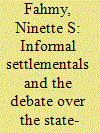

|
|
|
| 17 |
ID:
125105
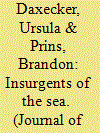

|
|
|
|
|
| Publication |
2013.
|
| Summary/Abstract |
While piracy may evoke romanticized visions of swashbuckling, rum swigging, and skirt chasing pirates hoisting the Jolly Roger, maritime piracy has changed substantially by taking advantage of modernization and substantial upgrading of the weapons, vessels, and weapons it employs. In addition, as documented by the International Maritime Bureau (IMB), the frequency of pirate attacks has increased significantly, with more than 2,600 piracy incidents occurring since 2004. The authors argue that piracy is a result of permissive institutional environments and the lack of legal forms of employment in states' fishing sectors. The authors investigate these arguments empirically using data for all countries with coastlines in the 1995-2007 period. The empirical analyses show that state weakness and reductions in fisheries production values affect piracy as expected. These findings suggest that international efforts in combating piracy should center on improving the institutional environments and labor opportunities driving maritime piracy.
|
|
|
|
|
|
|
|
|
|
|
|
|
|
|
|
| 18 |
ID:
125025
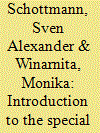

|
|
|
|
|
| Publication |
2013.
|
| Summary/Abstract |
The second half of the twentieth century witnessed the rise of what might arguably be described as political religion, with faith traditions everywhere experiencing parallels to the rise of Hindutva in India or the 'muscular' and virulently anti-minority political Buddhism of Sri Lanka and Myanmar. Similarly, Israel, a country founded by cosmopolitan, social-democratic nineteenth century perceptions of Jewish 'national' identity, is increasingly struggling with its ostensibly secular founding ethos. Religiously conservative political parties and attitudes have become mainstreamed in Israel's political landscape in the last couple of decades.1 What might help account for these seemingly similar developments, all of which appear to contradict the basic dictum of secularization theory, namely that increasingly prosperous, urban and industrialized societies will relegate religion and religious practices to the private sphere of a personal 'faith'? Until recently, the assumption persisted that the historical experience of Western Europe, the first part of the world to undergo industrialization and the wider sociocultural effects associated with the process of 'secularization', would be replicated as other parts of the world modernized. An important debate has ensued over the past 20 years or so, involving scholars representing a wide range of disciplinary backgrounds over what appears to be the revitalization of religion and even possibly processes of de-secularization.
|
|
|
|
|
|
|
|
|
|
|
|
|
|
|
|
| 19 |
ID:
128222
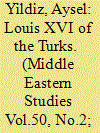

|
|
|
|
|
| Publication |
2014.
|
| Summary/Abstract |
Selim III ruled the Ottoman Empire in the Age of Revolutions, but his rule did not reflect the vigorous, expansionist and aggressive spirit of this age. He more resembled a ruler forced to defend his empire from the turbulence of the age, an effort which also shaped his character and perception of rulership. During his years in royal confinement, he clung passionately to the revival of the warrior-sultan through charismatic leadership. While on the throne, there was a gradual transformation of his perception of rulership and he became satisfied with being the bureaucratic ruler of the empire.
|
|
|
|
|
|
|
|
|
|
|
|
|
|
|
|
| 20 |
ID:
129981
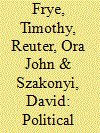

|
|
|
|
|
| Publication |
2014.
|
| Summary/Abstract |
The authors explore how modern autocrats win elections by inducing employers to mobilize their employees to vote for the regime and thereby subvert the electoral process. using two original surveys of employers and workers conducted around the 2011 parliamentary elections in russia, they find that just under one-quarter of employers engaged in some form of political mobilization. they then develop a simple framework for identifying which firms engage in voter mobilization and which workers are targeted for mobilization. firms that are vulnerable to state pressure-financially dependent firms and those in sectors characterized by asset immobility-are among the most common sites of workplace-based electoral subversion. the authors also find that workers who are especially dependent on their employer are more likely to be targeted for mobilization. By identifying the conditions under which workplace mobilization occurs in authoritarian regimes, the authors contribute to the long-standing debate about the economic bases of democratization. in addition, they explore an understudied means of subverting elections in contemporary autocracies: the use of economic coercion to mobilize voters. Moreover, their research finds that clientelist exchange can thrive in industrial settings and in the absence of deeply embedded political parties.
|
|
|
|
|
|
|
|
|
|
|
|
|
|
|
|
|
|
|
|
|